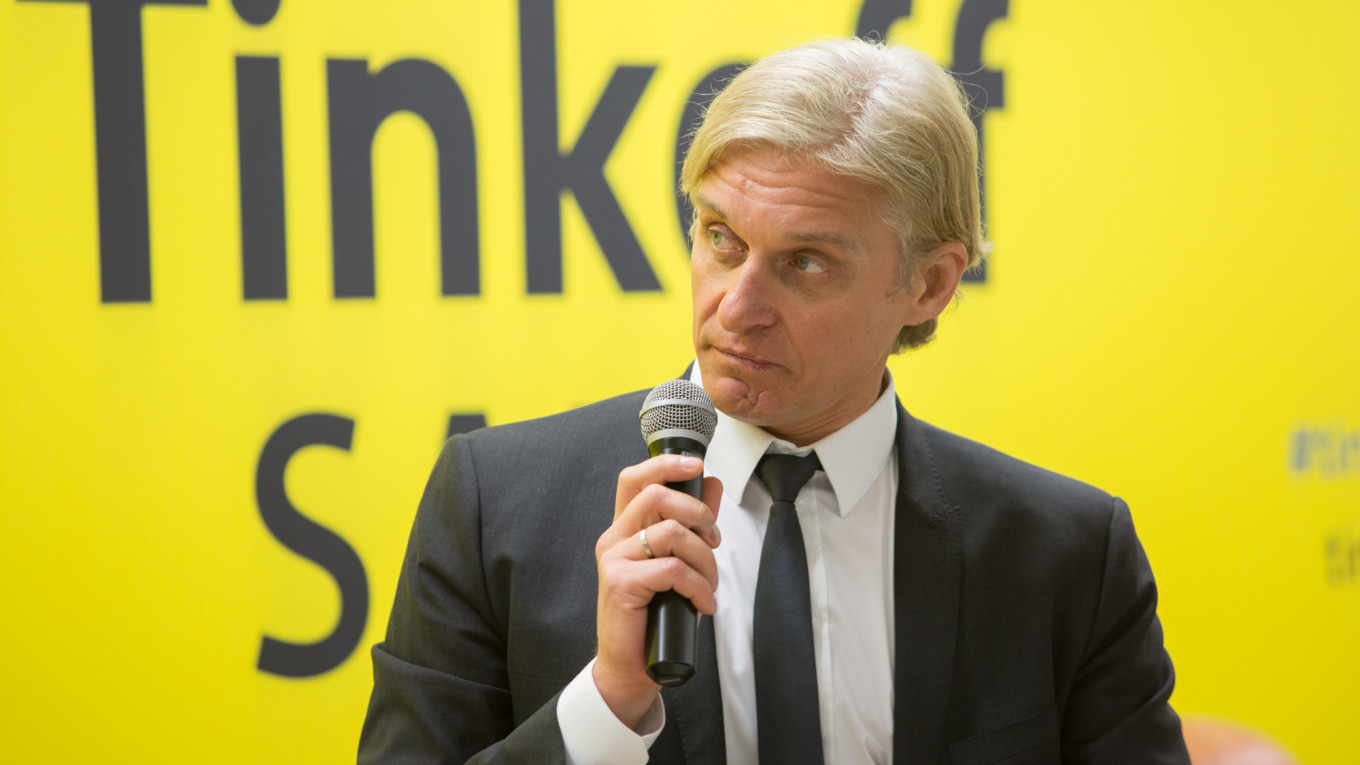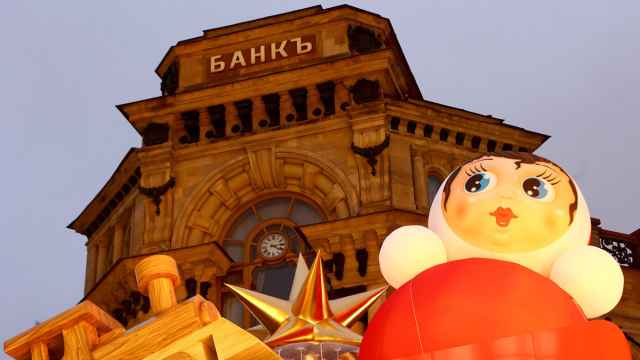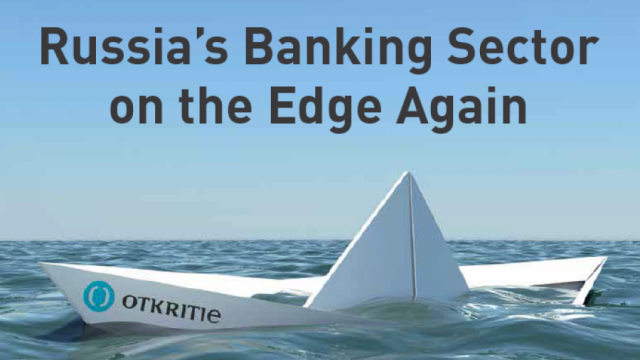Shares in Russian online bank Tinkoff began trading on the Moscow stock exchange Monday, in the latest stage of the bank’s shake-up of Russia’s banking sector.
The secondary listing is designed to help Tinkoff, which has its primary listing in London and is domiciled in Cyprus, tap into a retail investment boom in Russia and secure an estimated $200 million inflow from Russia-focused investment funds.
“This listing of Tinkoff global depository receipts [an investment vehicle which represents shares] on the Moscow Exchange is a huge milestone for our company,” said the bank’s founder Oleg Tinkov, a serial entrepreneur who launched Tinkoff bank in 2006.
Riding the wave
Tinkoff stands out in a heavily centralized Russian banking sector where around three-quarters of the market is controlled by state-owned players. Based on the same idea as the European and U.S. challenger banks which have emerged more recently, Tinkoff’s online-only model focuses on rapid customer growth in a bid to capture a growing share of Russia’s retail banking sector.
The model has, so far, proved a success. Tinkoff has been one of the major winners in the rapid growth of consumer credit, with the total stock of retail loans in Russia expanding from 10.6 to 16.3 trillion rubles ($260 billion) over the past five years.
Tinkoff’s clients top the 10 million mark, and the group’s own loan book is set to grow by more than 60% this year.
The expansion will drive profits to a record 35 billion rubles ($550 million), up 85% in two years.
CEO Oliver Hughes says the bank is gaining 400,000 new customers every month, and — assuming no “external shocks” — is on track to double the number of Tinkoff clients to 20 million within the next three years.
Pro-regulation
The ambitious growth plans come despite a push from Russia’s Central Bank and the Economics Ministry to temper the rapid acceleration of consumer lending through new regulation.
Hughes says he believes the Russian lending market is now “over-regulated.” But he is not complaining.
“The Central Bank is very strongly regulating the sector. They are not at all afraid to change things or to experiment,” Hughes said, speaking to The Moscow Times at an event at the Moscow Exchange to mark the launch of the secondary listing.
“We welcome all this regulation. It’s good for us … It increases the quality of our borrowers. We give short tenure, small ticket loans to under-leveraged customers. We want them to stay under-leveraged. We want them to stay with a low debt burden. All this regulation … protects our customers from more predatory practices from other guys in the business,” he added.
Growing pains
Some analysts, however, believe tighter regulation and general market trends could be a hiccup for Tinkoff. “Unsustainable” leverage and weakening quality of the loan portfolio were among the “yellow flags” raised by Mikhail Shlemov, an analyst at VTB Capital, over the health of the bank. Hughes said today that Tinkoff’s “cost of risk” — the share of loan defaults the bank is accounting for — is likely to come in at around 8% in 2019, up from 6% in 2018.
Another yellow flag is tougher competition. Launched as a challenger bank, Tinkoff is now the second largest provider of credit cards in Russia, behind only state-owned goliath Sberbank. This success has left Tinkoff with a target on its back as others play catch-up and industry figures cite the Tinkoff model as one to learn from.
As a retail bank, Tinkoff is also hostage to wider macroeconomic trends, such as continued interest rate cuts from the Central Bank, weak consumer confidence and stagnant living standards.
VTB Capital’s Shlemov told The Moscow Times today’s listing should be seen in this context, as a move to “offset the negative implications that are coming from weakening fundamentals.”
Index inclusion
Crucially, by listing on the Moscow Exchange, Tinkoff’s shares become eligible for inclusion in the MSCI Russia share index.
Inclusion, expected sometime next year, would mean an estimated $200 million boost in demand from institutional investors who buy funds that track the MSCI Russia index.

Being listed in Moscow will also help Tinkoff attract the attention of the booming number of Russian retail investors — up 50% so far this year to three million. Moscow-based investors are more likely to be familiar with the Tinkoff brand than those in London. Moreover, Tinkoff’s mobile broker service is already the market leader, with more clients than anybody else, including Sberbank.
The “Tinkoff Investments [mobile] app accounts for over 30% of retail investment accounts registered on the Moscow Exchange,” said Hughes. “Our listing on the Moscow Exchange should expand the company's investor base to include Russian investors who are not present in London.”
Longer-term
Tinkoff’s investment app is what Hughes calls a “locomotive product” — something designed to bring in customers who don’t want a Tinkoff loan or credit card.
“Our single most important metric is the number of customers that we have. We don’t like giving large loans to an individual customer. So we grow by the number of customers in our base, not by the balance of each customer in terms of borrowing.”
Other products designed to help Tinkoff hit its target of 20 million customers in three years include insurance, travel tickets, debit cards and small business bank accounts.
Tinkoff CEO Hughes says there will be slower growth in Tinkoff’s core lending products over the medium-term, and that other parts of the business will be vital in continuing to secure 400,000 new customers every month.
“This year was a one-off in terms of faster loan growth. We will not be growing our loan book by 60% next year. It’ll be back to normal — whatever that’s going to be.”
With new regulations largely focused on unsecured loans, Hughes said: “Secured lending will be one of the biggest drivers of our growth in terms of the balance sheet over the next few years.”
The bank also said it will resume paying quarterly dividends to investors in March or April next year, following a temporary suspension in June 2019.
Tinkoff shares were up 3% to a two-month high in morning trading in London on the news.
Asked whether any future moves to woo investors were in the pipeline, Hughes responded: “Do we need a third listing? It’s a big question. Never say never.”
A Message from The Moscow Times:
Dear readers,
We are facing unprecedented challenges. Russia's Prosecutor General's Office has designated The Moscow Times as an "undesirable" organization, criminalizing our work and putting our staff at risk of prosecution. This follows our earlier unjust labeling as a "foreign agent."
These actions are direct attempts to silence independent journalism in Russia. The authorities claim our work "discredits the decisions of the Russian leadership." We see things differently: we strive to provide accurate, unbiased reporting on Russia.
We, the journalists of The Moscow Times, refuse to be silenced. But to continue our work, we need your help.
Your support, no matter how small, makes a world of difference. If you can, please support us monthly starting from just $2. It's quick to set up, and every contribution makes a significant impact.
By supporting The Moscow Times, you're defending open, independent journalism in the face of repression. Thank you for standing with us.
Remind me later.







